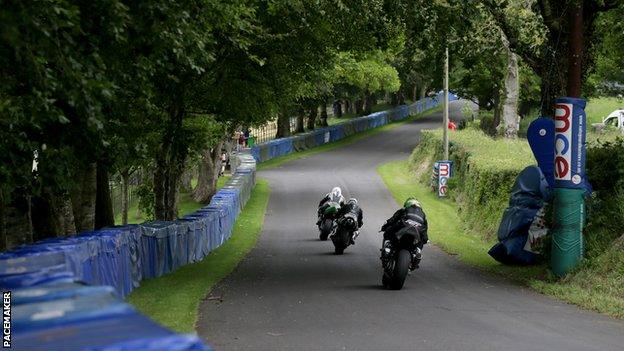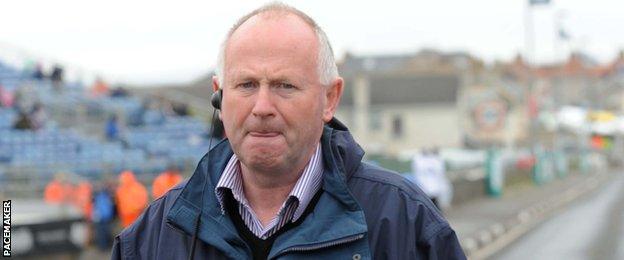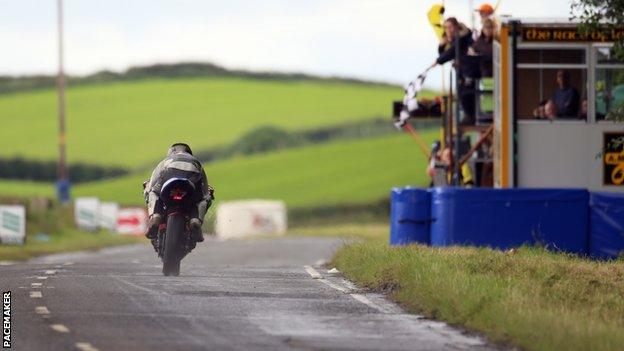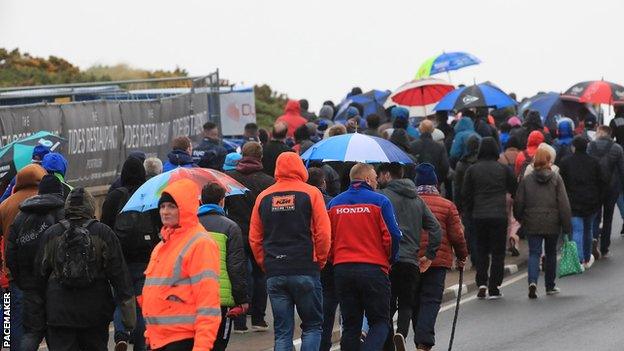Does motorcycle road racing on public roads in Ireland have a future?
- Published

The Enniskillen races are not part of the Irish road racing calendar for 2020
The island of Ireland has a rich and longstanding heritage of motorcycle racing on public roads - albeit one that while hugely popular divides public opinion because of the highly dangerous and sometimes tragic nature of the sport.
However in light of the financial difficulties being experienced by the Ulster Grand Prix and the news that the Enniskillen 100 meeting will not run in 2020 its future appears uncertain.
The Bush road races and the Mid Antrim 150 have also fallen by the wayside in recent years while the organisers of the Cookstown 100 have warned that the future of their event is hanging in the balance.
A number of meetings in the Republic of Ireland have also struggled in the face of economic realities in recent years.
Challenges to face
Among the challenges being faced are inclement weather, rising insurance costs, health and safety considerations and the fact that clubs remain largely reliant on programme sales as their primary source of income given that, with the notable exception of the UGP, they are unable to charge an entrance fee.
Many talented younger riders are choosing to ply their trade on short circuits while the age profile of many of those involved in the administrative and organisational side does not augur well.
Reduced grids are a feature of some classes at national races while race meetings remain dependent on the goodwill of residents and businesses located on road circuits, plus support from sponsors.
We asked a number of interested parties for their opinion about what the future holds for road racing.
'These are very worrying times'

Mervyn Whyte will head the organisation of the North West 200 for the 20th year in May
Mervyn Whyte (Event Director, North West 200): "Overall these are very worrying times. The big issue is the insurance aspect of things, with Public Liability Insurance rising and Personal Accident Insurance also increasing this year.
"Running the North West 200 costs £1m and to try and secure that income is no easy task - it involves working 24/7 to try and keep it going.
"Insurance is going to play a big part in deciding whether the sport will continue over the next three to five years and could eventually kill it off.
"There are a number of big outstanding claims to settle too which will heap even more cost on organising clubs, while the insurance companies could start to say 'this is costing us money'.
"It's going to be a struggle and the future is anything but rosy at present but hopefully it will change. It's not getting any easier."
'A passionate following..but rudderless and lacking direction'
Stephen Davison (journalist/photographer): "Road racing has experienced dips before periodically, times when the sport has fallen into difficult times and there has not been the same depth to the grids, but the sport is at a different juncture now.
"Pressures have been growing in terms of costs forever rising and organisers struggling to meet the financial demands caused by things like insurance and safety equipment.
"A lot of people still have a lot of enthusiasm and love the sport but the culture of road racing has changed and it is very susceptible to the elements - all the internationals were hit by the weather last year.
"In Ireland we race in the rain on wet roads and spectators tend to get fed up with delays and hanging around, plus the facilities are basic compared to other outdoor attractions in terms of food, toilets, parking etc.

Road race fans hope the chequered flag will not come down on the sport
"Having said that, while a lot of other sports have been sanitised by commercialisation, road racing is still a very visceral experience with incredible mind-blowing action up close that you don't see in any other sport.
"At the same time it is also incredibly dangerous because of that and health and safety is a factor. An element of that proximity has been removed.
"The organisation of the sport is also fragmented. There is a level of co-operation but each club runs its own event, with very little input from a governing body to take overall responsibility. Every club is left on their own so the sport is rudderless and lacks direction.
"The responsibilities involved with running an event are so great that people are reluctant to get involved but there is a lot of history and a lot of passion and while there are people with that mentality there is hope."
'On a downward trend...hard to see it being turned around'
Kenny Loughrin (Treasurer/PRO, Cookstown Club): "Last year we had a problem with the predictions of rain which did us a lot of harm. We ended up having better weather than was forecast but it affected the crowd and people did not come in anything like the usual numbers - we only sold 1200 programmes compared to the usual 2500.
"That fall in programme sales resulted in a big drop in income and the National road races can't afford that situation. If we have another bad year we will be in trouble.
"We have also witnessed a drop in the number of entries, especially from top class riders from Northern Ireland - most of the up and coming young talent is going to British Superbikes, not the roads.
"Road racing in general faces a lot of difficulties and is on a downward trend. It is sad to see but it is hard to see it being turned around. Years ago there were so many top riders and it takes those names to attract the public."

Inclement weather has curtailed fans' enjoyment of road racing on several occasions in recent years
'Road racing definitely at a crossroads'
Liam Beckett (Radio Ulster pundit and media contributor): "I am as concerned as many others as to where the future lies - road racing has been on a slippery slope for a considerable period of time. I am looking for light at the end of the tunnel but I'm struggling to see it.
"Over the years I have watched the demise of so many smaller national races and now we are on the verge of losing one of the major internationals in the Ulster Grand Prix, which is most of the pure road racers' favourite circuit. It may well disappear from the calendar and if it does I doubt it will ever return.
"It's no secret that a lot of the smaller road races are not finding life easy so how long can they continue? Road racing is definitely at a crossroads.
"How can any young rider contemplate earning a living out of the sport just from the North West 200 and Isle of Man TT.
"I feel for the organisers of all the road races as they are trying their best to drum up sponsorship, stage their meetings and offer as much prize money as they can but the dividend for the riders at the end of the day is pathetic given their skill and ability, the entertainment they put on and the risks they take.
"The organisers are struggling to make ends meet and get sponsorship in but when you compare the financial rewards to other much lower risk sports there is no comparison."
'On a slippery slope, in the worst shape it's ever been in'
Ryan Farquhar (Champion rider, team owner/engineer): "It is going down a very slippery slope. Insurance costs, running the bikes - everything is more expensive and there are fewer sponsors involved.
"The best days of road racing are definitely over.
"You go back 10 years and you had lots of road races but it's getting to the stage that if many more fall by the wayside it won't really be worth putting a team together for just a few meetings. It would be just too expensive.
"Road racing is in the worst shape it has ever been."